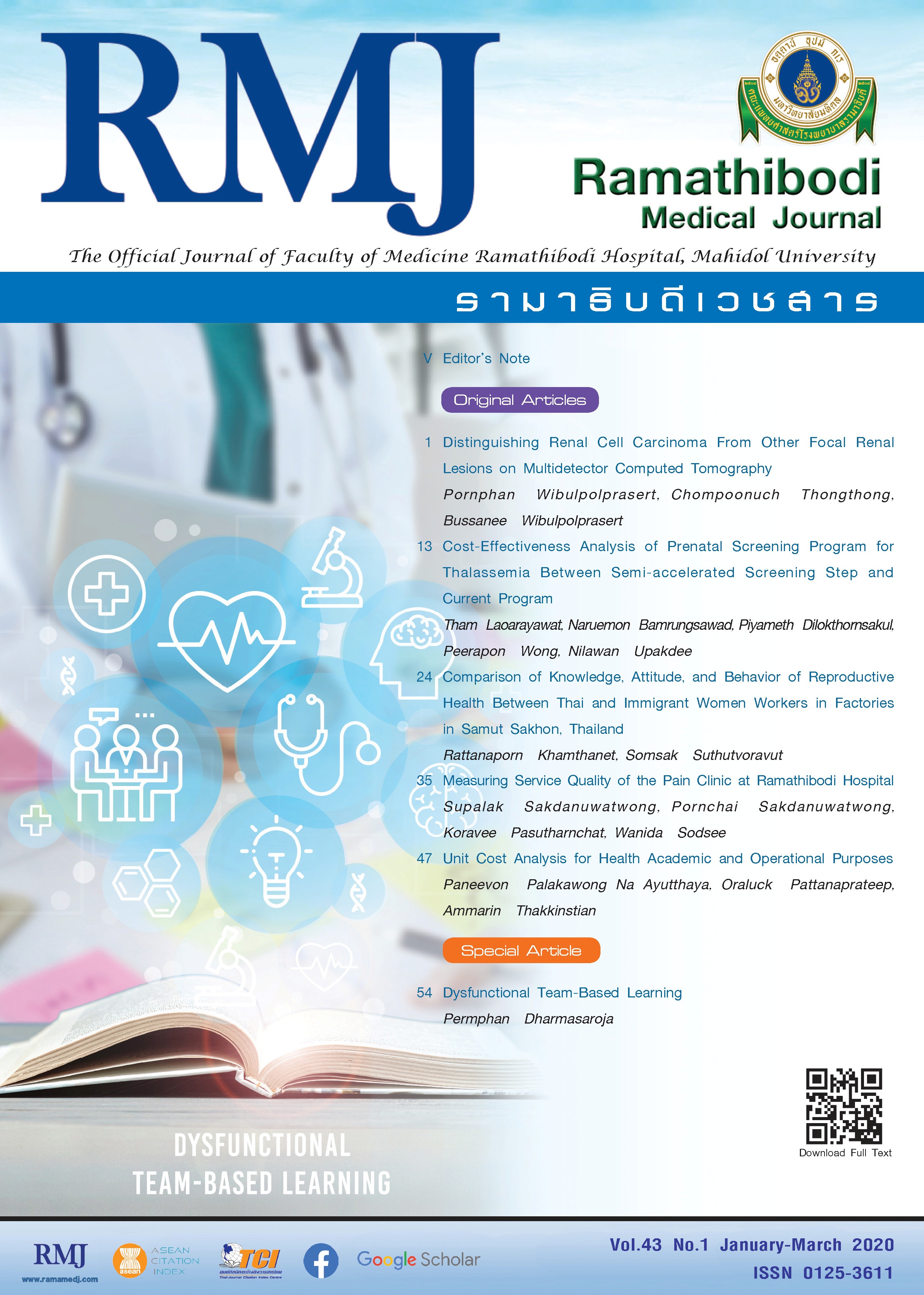Dysfunctional Team-Based Learning
DOI:
https://doi.org/10.33165/rmj.2020.43.1.227790Keywords:
Team-based learning, Active learning, Small group learning, Medical educationAbstract
Team-based learning (TBL) is an innovative teacher-driven teaching method that uses a specific sequence of activities to foster individual and group responsibility in small groups of students that have been formed in order to answer questions and solve problems. TBL appears to have a number of benefits compared to conventional lecture-based teaching and traditional small group learning models. However, TBL has been modified in several ways for use in teaching within the curricula of medical schools. Research on the effects of TBL on the learning of students is still limited, and studies aimed at investigating whether the goals of TBL are achieved are rare. Medical schools that want to implement TBL in their curriculum and gain the benefits of TBL should ensure that those involved in the curricular process understand the essence of TBL. This review is primarily aimed at describing how dysfunctional TBL develops, and providing some suggestions regarding how to avoid it.
References
Parmelee D, Michaelsen LK, Cook S, Hudes PD. Team-based learning: a practical guide: AMEE guide no. 65. Med Teach. 2012;34(5):e275-e287. doi:10.3109/0142159X.2012.651179.
Michaelsen LK, Watson WE, Cragin JP, Fink, LD. Team-based learning: a potential solution to the problems of large classes. Exchange Org Behav Teach J. 1982;7(4):18-33.
Koles PG, Stolfi A, Borges NJ, Nelson S, Parmelee DX. The impact of team-based learning on medical students’ academic performance. Acad Med. 2010;85(11):1739-1745. doi:10.1097/ACM.0b013e3181f52bed.
Zgheib NK, Simaan JA, Sabra R. Using team-based learning to teach pharmacology to second year medical students improves student performance. Med Teach. 2010;32(2):130-135. doi:10.3109/01421590903548521.
Thomas PA, Bowen CW. A controlled trial of team-based learning in an ambulatory medicine clerkship for medical students. Teach Learn Med. 2011;23(1):31-36. doi:10.1080/10401334.2011.536888.
Chen M, Ni C, Hu Y, et al. Meta-analysis on the effectiveness of team-based learning on medical education in China. BMC Med Educ. 2018;18(1):77. doi:10.1186/s12909-018-1179-1.
Persky AM, Pollack GM. A modified team-based learning physiology course. Am J Pharm Educ. 2011;75(10):204. doi:10.5688/ajpe7510204.
Inuwa IM. Perceptions and attitudes of first-year medical students on a modified team-based learning (TBL) strategy in anatomy. Sultan Qaboos Univ Med J. 2012;12(3):336-343. doi:10.12816/0003148.
Inuwa IM, Al-Rawahy M, Roychoudhry S, Taranikanti V. Implementing a modified team-based learning strategy in the first phase of an outcome-based curriculum--challenges and prospects. Med Teach. 2012;34(7):e492-e499. doi:10.3109/0142159X.2012.668633.
Gopalan C, Kist W. A case study approach, combined with modified team-based learning, to teach the progression of metabolic syndrome to type 2 diabetes. Adv Physiol Educ. 2018;42(1):84-89. doi:10.1152/advan.00141.2017.
Smeby SS, Lillebo B, Slordahl TS, Berntsen EM. Express team-based learning (eTBL): a time-efficient TBL approach in neuroradiology. Acad Radiol. 2019. doi:10.1016/j.acra.2019.04.022.
Knollmann-Ritschel BE, Durning SJ. Using concept maps in a modified team-based learning exercise. Mil Med. 2015;180(4 Suppl):64-70. doi:10.7205/MILMED-D-14-00568.
Huang Z, Li M, Zhou Y, et al. Modified team-based learning in an ophthalmology clerkship in China. PLoS One. 2016;11(4):e0154250. doi:10.1371/journal.pone.0154250.
Gopalan C, Klann MC. The effect of flipped teaching combined with modified team-based learning on student performance in physiology. Adv Physiol Educ. 2017;41(3):363-367. doi:10.1152/advan.00179.2016.
Schmidt HG, Rotgans JI, Rajalingam P, Low-Beer N. A psychological foundation for team-based learning: knowledge reconsolidation. Acad Med. 2019;94(12):1878-1883. doi:10.1097/ACM.0000000000002810.
Bass RZ, Morgan DE, Brooks WS. A Case of pancreatic cancer: abdominal anatomy team-based learning module for medical students. MedEdPORTAL. 2018;14:10700. doi:10.15766/mep_2374-8265.10700.
Chang Y, Brickman P. When group work doesn’t work: insights from students. CBE Life Sci Educ. 2018;17(3):ar42. doi:10.1187/cbe.17-09-0199.
Iqbal M, Velan GM, O’Sullivan AJ, Balasooriya C. Differential impact of student behaviours on group interaction and collaborative learning: medical students’ and tutors’ perspectives. BMC Med Educ. 2016;16(1):217. doi:10.1186/s12909-016-0730-1.
Sutherland S, Bahramifarid N, Jalali A. Team-based learning from theory to practice: faculty reactions to the innovation. Teach Learn Med. 2013;25(3):231-236. doi:10.1080/10401334.2013.797343.
Carrasco GA, Behling KC, Lopez OJ. A novel grading strategy for team-based learning exercises in a hands-on course in molecular biology for senior undergraduate underrepresented students in medicine resulted in stronger student performance. Biochem Mol Biol Educ. 2019;47(2):115-123. doi:10.1002/bmb.21200.
Cho AR, Han SI, Yoon SH, Park JH, Yoo NJ, Kim S. Methods of effective team-based learning administration and expected effects on medical education. Korean J Med Educ. 2010;22(1):47-55. doi:10.3946/kjme.2010.22.1.47.
Farland MZ, Feng X, Behar-Horenstein LS, Beck DE. Impact of team formation method on student team performance across multiple courses incorporating team-based learning. Am J Pharm Educ. 2019;83(6):7030. doi:10.5688/ajpe7030.
Nasr R, Antoun J, Sabra R, Zgheib NK. Interactive and collaborative learning in the classroom at the medical school Automated response systems and team-based learning. J Med Liban. 2016;64(4):217-222. doi:10.12816/0033796.
Hunt DP, Haidet P, Coverdale JH, Richards B. The effect of using team learning in an evidence-based medicine course for medical students. Teach Learn Med. 2003;15(2):131-139. doi:10.1207/S15328015TLM1502_11.
Hrynchak P, Batty H. The educational theory basis of team-based learning. Med Teach. 2012;34(10):796-801. doi:10.3109/0142159X.2012.687120.
Parthasarathy P, Apampa B, Manfrin A. Perception of team-based learning using the team-based learning student assessment instrument: an exploratory analysis within pharmacy and biomedical students in the United Kingdom. J Educ Eval Health Prof. 2019;16:23. doi:10.3352/jeehp.2019.16.23.
Kibble JD, Bellew C, Asmar A, Barkley L. Team-based learning in large enrollment classes. Adv Physiol Educ. 2016;40(4):435-442. doi:10.1152/advan.00095.2016.
Davidson LK. A 3-year experience implementing blended TBL: active instructional methods can shift student attitudes to learning. Med Teach. 2011;33(9):750-753. doi:10.3109/0142159X.2011.558948.
Fete MG, Haight RC, Clapp P, McCollum M. Peer evaluation instrument development, administration, and assessment in a team-based learning curriculum. Am J Pharm Educ. 2017;81(4):68. doi:10.5688/ajpe81468.
Kay D, Kibble J. Learning theories 101: application to everyday teaching and scholarship. Adv Physiol Educ. 2016;40(1):17-25. doi:10.1152/advan.00132.2015.
Sumrithe S. Team-based learning in medical curriculum. Rama Med J. 2018;41(2):135-142. doi:10.14456/rmj.2018.23.

















